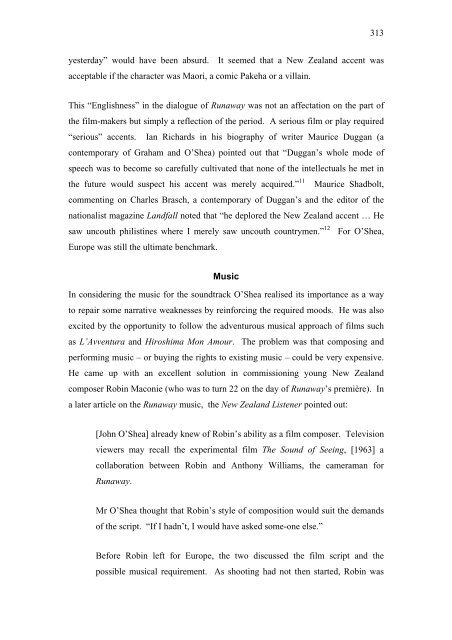Copyright Statement - ResearchSpace@Auckland
Copyright Statement - ResearchSpace@Auckland
Copyright Statement - ResearchSpace@Auckland
You also want an ePaper? Increase the reach of your titles
YUMPU automatically turns print PDFs into web optimized ePapers that Google loves.
313<br />
yesterday” would have been absurd. It seemed that a New Zealand accent was<br />
acceptable if the character was Maori, a comic Pakeha or a villain.<br />
This “Englishness” in the dialogue of Runaway was not an affectation on the part of<br />
the film-makers but simply a reflection of the period. A serious film or play required<br />
“serious” accents. Ian Richards in his biography of writer Maurice Duggan (a<br />
contemporary of Graham and O’Shea) pointed out that “Duggan’s whole mode of<br />
speech was to become so carefully cultivated that none of the intellectuals he met in<br />
the future would suspect his accent was merely acquired.” 11 Maurice Shadbolt,<br />
commenting on Charles Brasch, a contemporary of Duggan’s and the editor of the<br />
nationalist magazine Landfall noted that “he deplored the New Zealand accent … He<br />
saw uncouth philistines where I merely saw uncouth countrymen.” 12 For O’Shea,<br />
Europe was still the ultimate benchmark.<br />
Music<br />
In considering the music for the soundtrack O’Shea realised its importance as a way<br />
to repair some narrative weaknesses by reinforcing the required moods. He was also<br />
excited by the opportunity to follow the adventurous musical approach of films such<br />
as L’Avventura and Hiroshima Mon Amour. The problem was that composing and<br />
performing music – or buying the rights to existing music – could be very expensive.<br />
He came up with an excellent solution in commissioning young New Zealand<br />
composer Robin Maconie (who was to turn 22 on the day of Runaway’s première). In<br />
a later article on the Runaway music, the New Zealand Listener pointed out:<br />
[John O’Shea] already knew of Robin’s ability as a film composer. Television<br />
viewers may recall the experimental film The Sound of Seeing, [1963] a<br />
collaboration between Robin and Anthony Williams, the cameraman for<br />
Runaway.<br />
Mr O’Shea thought that Robin’s style of composition would suit the demands<br />
of the script. “If I hadn’t, I would have asked some-one else.”<br />
Before Robin left for Europe, the two discussed the film script and the<br />
possible musical requirement. As shooting had not then started, Robin was















